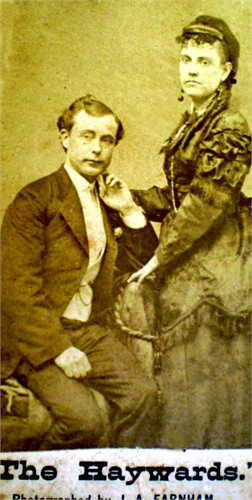Mother’s Biased Love and Loyalty Follows Chosen Son to the Grave and Beyond
By SUE HUNTER WEIR
Much, perhaps too much, has been written about Harry Hayward, the most notorious person buried in the Cemetery. Less has been written about his family. Harry was the youngest of William and Lodusky Hayward’s three sons. He was their golden boy, the son who could do no wrong—except that he orchestrated the murder-for-hire of Catherine (Kitty) Ging.
Lodusky Hayward was perhaps the strangest member of the family. She was born in Illinois on August 5, 1836. In 1860, she married William Wirt Hayward. They had three sons: Thadeus, Adry, and Harry. Their only daughter, Williametta, died in 1870 when she was two years old.
The Haywards arrived in Minnesota in the 1860s. William became a successful real estate dealer. Thadeus was a dentist, Adry a businessman, and Harry, who had no profession, was best known as a womanizer and gambler. Their lives were disrupted in 1894 when Harry was arrested for plotting the murder of Kitty Ging on December 3, 1894.

Justice moved more swiftly then than it does today. Harry’s trial began on January 21, 1895. The two key witnesses against him were Claus Blixt, the man who shot Kitty at Harry’s behest, and Harry’s brother Adry. Adry was described as a “drudge,” the family’s dutiful son who could never measure up to his charming younger brother.
In his opening statement, Frank Nye, one of the prosecutor’s said: “So blind was [Harry] in his trust in his lucky star that he thought all things would turn his way, that luck was with him—fortune had smiled on him…” And, why wouldn’t he think that? Harry had offered Adry $2,000 to kill Kitty Ging. Adry was horrified but knew that telling his parents was useless, they would never believe him. Instead, he told Levi Stewart, a lawyer and family friend.
When Adry was on the witness stand, Lodusky, who was sitting next to Harry, cried out, instructing Harry to, “Look him in the eye, Harry—look him in the eye.” She kept shaking her head which prompted Adry to tell her, “Don’t shake your head mother! It is the truth, and you know it.”
Harry’s lawyers’ strategy was to prove that Adry was an unreliable witness, that it was Adry, not Harry, who had conspired with Claus Blixt. Unlike Harry who stood to gain financially from Kitty’s death, Adry’s only motive would have been revenge; his desire to “get Harry.” When Adry’s testimony concluded, Harry tried to comfort his mother. He held her hands and told her, “Mother, dear little woman, don’t worry yourself. This will come out all right.”
When it was Lodusky’s turn to testify, his lawyers tried to show that both sides of the family had a history of mental illness which might explain why Adry was, as they claimed, delusional. The judge ruled this “insane ancestry” as inadmissible evidence. Instead, the lawyers questioned her about her middle son’s behavior. She testified that his actions were always “…strange to me, [they] seemed very strange.” It was clear that she was willing to sacrifice Adry’s life for Harry’s.
Harry was wrong. Things did not turn out all right. The judge instructed the jurors that they could only find Harry guilty if they believed the testimony of his brother. They did. After a trial that had lasted seven weeks, it took the jury only three hours to declare Harry guilty of first-degree murder. He was sentenced to hang.
The family discord did not end with Harry’s death. During the memorial service that was held for him, Lodusky threw petals from white carnations on his coffin. She moaned and cried out, “My baby boy! God has forgiven him! O, God has forgiven him.”
Then her voice changed and she began channeling Harry’s spirit: “Be brave, mother. Be brave and strong. For chains bind me but cannot chain my soul. I’ll come back to you.” She then placed her hands on Adry’s face and said, “Tell him I’ve forgiven him, mother.” Adry was stricken. He did not follow his family from the chapel.
Harry may (or may not) have forgiven Adry from beyond the grave, but whether or not Adry was ever able to forgive his parents, especially his mother, for her betrayal is an open question.
Lodusky Hayward died on September 11, 1903, from apoplexy at the age of 65. William Hayward died on February 13, 1915, from pneumonia at the age of 81. They are buried next to their favorite son in Lot 33, Block D.
Sue Hunter Weir is chair of Friends of the Cemetery, an organization dedicated to preserving and maintaining Minneapolis Pioneers and Soldiers Cemetery. She has lived in Phillips for almost 50 years and loves living in such a historic community.









